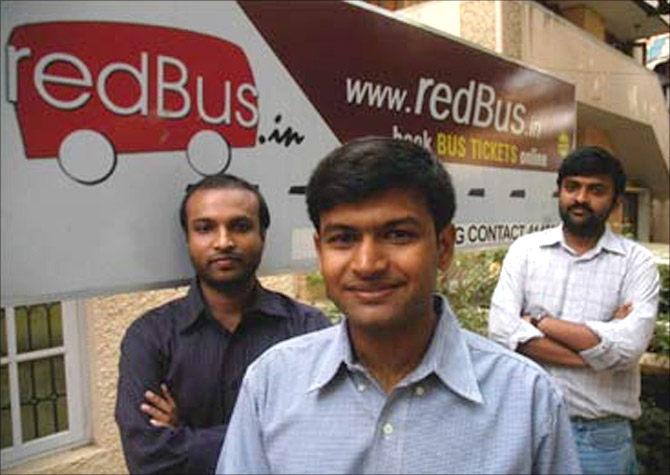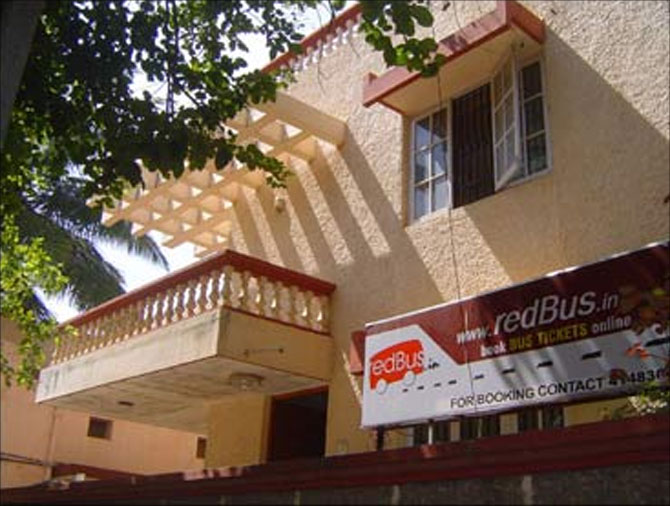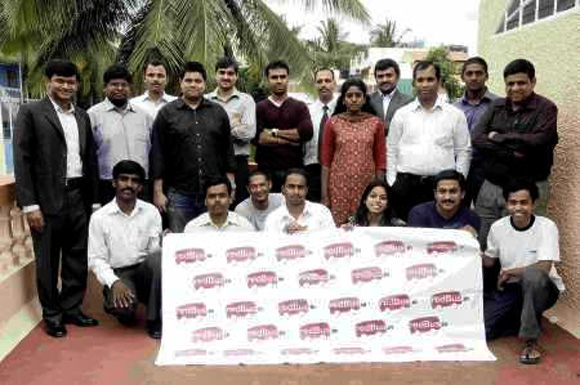 | « Back to article | Print this article |
The secret behind redBus' success story
redBus.in is the second highest transacted travel website in the country, next only to IRCTC.
Somewhere in 2006 when Phanindra Sama and his friends approached The Indus Entrepreneurs (TiE) for support to incubate their raw business solution as a venture, it introduced them to their first mentor, Anand Rajaram, himself a successful entrepreneur and a seed investor.
The first advice he gave to Sama and his teammates made a lasting impression on the minds of these aspiring entrepreneurs and led them to build one of the most successful ecommerce ventures in the country.
Rajaram told them he often felt surprised and laughed at people who spend a lot of money on T-shirts with logos of well-known brand to earn respect from others. Instead, they should buy clothes that give comfort.
The moral of the story for the team was to be careful about their spending habits. It should be need-based, instead of massaging egos and earning respect.
Till date, not just Sama but most of the team management prefer to travel by buses when going to neighbouring cities to do jobs that can wait for the time spent on a night’s travel.
Rajaram, who spent his initial years at Wipro working closely with its founder chairman Azim Premji, used to tell the redBus founding team stories on how the latter never compromises on the value system and never takes short-cuts like bribery to get work done.
Click NEXT to read more…
The secret behind redBus' success story
“Maybe, we could have grown a little faster by getting work done by paying a bribe but that was never meant to be long-lasting,” says Sama, the co-founder and chief executive of Pilani Soft Labs, which owns the redBus platform.
The company, recently acquired by South African media giant Naspers through its Indian subsidiary, ibiboGroup, for around $120 million (around Rs 790 crore today), has since grown at a scorching pace to establish a virtual monopoly in the bus ticketing market in India.
It commands a whopping 65 per cent market share in this segment, issuing 12 million bus tickets a year, with a gross merchandise value (GMV) of around Rs 600 crore. The platform developed by Sama and his two other colleagues, Charan Padmaraju and Sudhakar Pasupunuri, initially as a not-for-profit initiative, today supports 1,200 bus operators belonging to 24 states, apart from the road transport corporations of five states.
“redBus is the dominant online bus ticket aggregator, with a well-recognised brand among bus travellers, as demonstrated by its market share, growth, quality of traffic and conversation rates, and with deep relationships among major luxury bus operators,” said Nitin Nayar, managing director, Warburg Pincus India.
“Further, redBus is developing proprietary data to strengthen its long-term lead. User reviews on the consumer side, and custom analytics to help operators plan routes and offer dynamic pricing will ensure all participants continue to be engaged with the platform, even as the market becomes more competitive,” Nayar added.
Click NEXT to read more…
The secret behind redBus' success story
What made redBus grow at such a past pace? Sama says there are many factors. From the external point of view, it could be the sheer luck of identifying the right opportunity at the right time.
“When we started this, internet was not that big. We were perhaps slightly ignorant, because nobody else believed that even so many number of bus tickets could be sold though internet. Otherwise, somebody else would have started,” says Sama.
For Sama and his friends, the idea of developing an online bus ticketing platform came out of their personal need, to address an issue most bus passengers face.
It started after Sama failed to get a bus to his home city during the Durga Puja time in 2005.
When he proposed an idea to develop this platform, his other two co-founders who were staying in the same flat liked it very much.
They started taking the help of a few other techies (in fact, initially seven of them had started working on developing the platform), who were staying in the same flat.
The idea was to empower bus operators by providing this as an open source platform. But it never clicked, as not many were ready to take it even as free. At this juncture, someone suggested they approach TiE.
Click NEXT to read more…
The secret behind redBus' success story
As advised by their mentor, Sama and his team had to first identify the market opportunities for their venture. They decided to start with Karnataka. There was no study done to evaluate this industry. At that stage, they did not have funds to appoint anybody to do it. So, they decided to do it themselves.
“We went to Kalasipalyam (a place in Bangalore from where most private buses operate) and checked shop by shop. They gave some information but that was based more on guess. So, we tried to find the most repetitive number. That’s how we did the survey,” recalls Sama.
Thus, the team gave shape to a company known for its flagship redBus platform. Sama virtually built a sector that was almost non-existent and created the market and the demand.
“redBus created a huge market for online bus ticketing, not even seen as a market by the big players, and helped create several other companies along the way,” said Dasharatham Bitla, founder and chief executive of Bitla Software, which also develops bus travel management software.
Click NEXT to read more…
The secret behind redBus' success story
“redBus created a huge market for online bus ticketing, which was not even seen as a market by the big players and helped create several other companies along the way,” he added.
redBus and Sama never looked back since then. With an initial funding of just Rs 2.5 crore from Seedfund in 2007 and a subsequent round by Inventus of around Rs 8 crore (Rs 80 million), the company started growing at a scorching pace from the first year.
From just Rs 50 lakh of GMV in the first year (it’s for six months as the company started in August) to Rs 5 crore (Rs 50 million) in the second year and Rs 30 crore (Rs 300 million) in the third year. The GMV had hit Rs 600 crore (Rs 6 billion) in 2012, when the company last publicly disclosed the figure.
Apart from giving birth to the online bus ticketing industry, redBus engine today runs on most of the competing online bus ticketing platforms. The bus ticketing platforms of the competitions such as MakeMyTrip, Expedia and via.com share the revenues with it for every ticket booked using its platform.
And that is what Sama believes in. “In internet, there is space for only one company in every field of internet. For example, we only have one popular search engine, one popular social platform. So there is always a big race to become that large company because all of them know that unless they become large, they will become smaller and smaller and die one day,” concludes Sama.
THE ROAD COVERED
redBus.in is the second highest transacted travel website in the country, next only to IRCTC
1,200 bus operators use the redBus platform
Around 700 employees, with 26 offices across 24 states
10,000 travel agents use SeatSeller, an inventory distribution platform for agents to sell bus tickets
Five government road transport corporations use redBus to sell their bus tickets
Eight call centres to support





